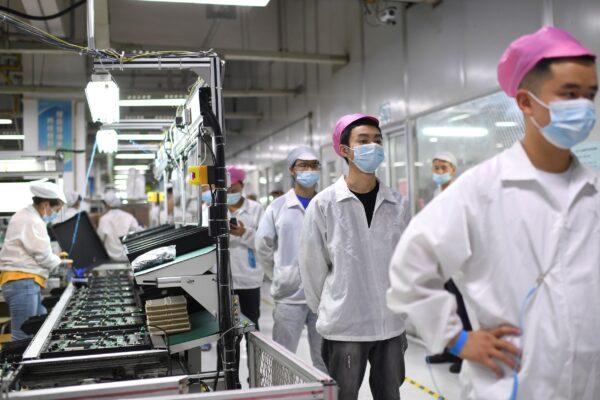“I had my personal experience,“ he said. ”All the effort I have put in for years went down the drain because of the lockdowns.
“There’s no way for China to recover in a few months—or even in a few years,” he said.
‘Lockdown Killed My Business’
Meng Jun was a manufacturer of latex-based products that were exported primarily to Southeast Asia. His plant was located in an industrial park of Nanning City in southwest China, near the Vietnamese border. His production lines were forced to shut down whenever the city implemented a lockdown. During the COVID pandemic, it was common for individual municipalities to issue lockdown decrees that could last for weeks—or even months.There was no subsidy or assistance from the government for pandemic-related losses, he said. Even worse, Meng said the company continued to suffer financially from having to bribe officials who could arbitrarily ban the company from selling its products in the name of their “testing positive” for COVID-19.
The strict Zero-COVID policies killed 90 percent of companies inside the industrial park, from packaging to lumber businesses, and “no one could withstand it,” he said.
The company had to come up with all the fees for pandemic control. “They (the Communist Party officials) didn’t care, they were only responsible for collecting fees,” Meng explained.
In July 2021, when the city was placed under lockdown, all private companies received orders to halt production.
However, Meng’s company still had to cover the rent, the workers’ minimum wages, and nucleic acid tests demanded by the government.
A single positive test case from one employee would result in the quarantine of the entire plant’s workers.
The workers’ tests cost him 5,000 yuan ($723.37) per month, and the regime also required testing of the raw materials.
The materials would not receive a stamp of approval if they tested positive, and the losses would have been tremendous, as that would have meant that all materials would be embargoed.
However, Meng said that the tests on the materials soon became a formality. No actual testing was carried out—but the officials would still visit the plant regularly to collect the testing fees.
Meng said that in order to keep production going, every company at the park had to bribe the officials who came with the test forms. “It was not really for pandemic control, but to get the money,” he said.
The best items to bribe such officials included cash, expensive cigarettes, and alcohol—as well as meals at local restaurants, Meng said.

Exceptions to the Rule
While most private entrepreneurs suffered from the lockdowns, government-owned businesses maintained regular production, Meng explained.“It’s just too difficult to run a business in China,“ he said. ”You would not know until you get out of China and compare it to the outside world.”
Between 2020 and 2021, he injected 8 million yuan ($1.16 million) into the company, but lost everything from the lockdowns. He quickly made the decision to close the company after the Chinese New Year in 2022.
When the pandemic hit the area hardest two months later in April, he left China.
With a friend’s help, Meng managed to obtain a valid nucleic acid test report, which allowed him to pass through Chinese customs. He arrived in the United States with a valid visa.
“I am bankrupt, although I am lucky that I escaped,“ he said. ”But my wife is still in China.”
Meng said he regrets that his wife could not travel to the United States with him. “I will not return to China as long as the Chinese Communist Party (CCP) is ruling the country,” he told the Chinese-language edition of The Epoch Times.
A Tragic Case
There were many tragic cases under the Chinese regime’s strict lockdowns and Zero-COVID policies. Meng said that a businessman he knew, Mr. Chen (a pseudonym), committed suicide at the age of 57 before the Chinese New Year in 2022.Meng said that Chen’s business was much larger than his. But the lockdown immediately buried Chen under a debt of 6 million yuan ($870,000), including wages, bank loans, the cost of materials, and rent.
Chen committed suicide due to the unbearable stress caused by debt collectors, he said.
Awakening From the ‘Farce’
In 2020, Meng started to search for information on the pandemic by bypassing the Great Firewall—the CCP’s internet firewall that prevents Chinese citizens from using the internet to access uncensored information from abroad.He learned that while other countries had gradually lifted their pandemic controls and recovered economically from the pandemic, the lockdown in China was getting more serious.
He had doubts about the constant propaganda in China regarding the pandemic.
Online censorship blocked even the Chinese words “white paper,” he said. “There’s no freedom of expression: I can’t even hold a piece of paper freely.”
Meng saw that “it’s the CCP causing the pandemic—it must be held accountable,” he said. Several acquaintances of his in industry have all prepared to sell their assets in China in order to move overseas.
They are not fools, he said, adding that China’s communist regime places itself above the law, and its chaotic policies have made people realize that the COVID-19 pandemic was a farce.
“The economic conditions are terrible. Exports were choked, and domestic consumption was down to a terrible level,” he said.




